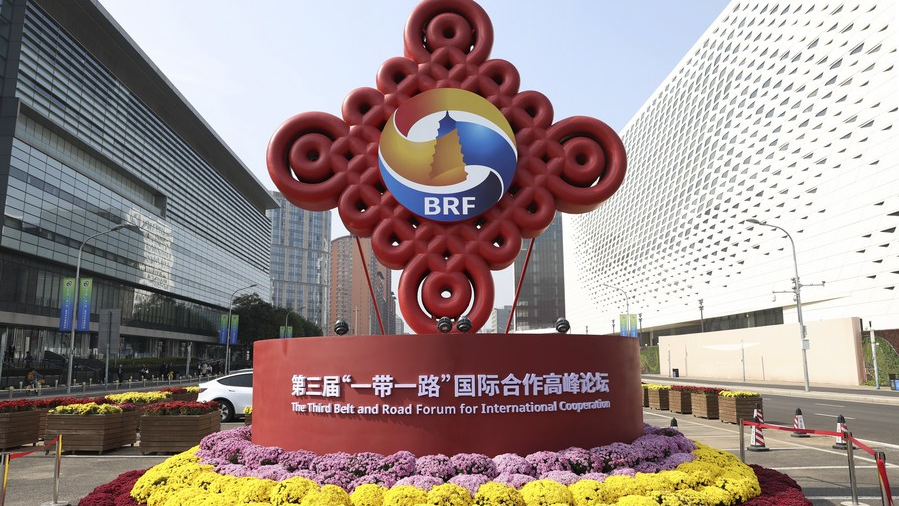
A decoration for the third Belt and Road Forum for International Cooperation near the China National Convention Center in Beijing, capital of China, October 17, 2023. /Xinhua
A decoration for the third Belt and Road Forum for International Cooperation near the China National Convention Center in Beijing, capital of China, October 17, 2023. /Xinhua
Editor's note: Huang Yongfu, a special commentator for CGTN, is an economic affairs commentator. After earning a PhD, he started his career at the University of Cambridge and then moved on to the UN system. His current interests lie in Sino-U.S. links and global development. The article reflects the author's opinions and not necessarily the views of CGTN.
The third Belt and Road Forum for International Cooperation (BRF) marks another important milestone in the process of jointly building the Belt and Road Initiative (BRI).
Chinese President Xi Jinping delivered a keynote speech at the opening ceremony of the event. He highlighted the importance of the decade-long journey of the BRI, and laid out a road map for its future journey with eight major steps.
China's development philosophy behind the BRI benefits global modernization and Global South
In his speech at the forum, President Xi emphasized the importance and benefits of economic interdependence and win-win cooperation, with a firm belief that China's own success is intertwined with the international community, meaning that "China can do well only when the world is doing well while the world will get even better when China does well. "
Chinese modernization is not an isolation process but a collective endeavor involving all countries, particularly developing countries, based on peaceful development, mutual cooperation and shared prosperity.
Since its inception in 2013, the BRI has generated 420,000 jobs for participating countries and lifted about 40 million people out of poverty.
To promote the high-quality construction of the BRI is to let more countries and people gain from it. President Xi announced eight major steps to support the joint pursuit of a high-quality BRI, including new plans for transnational and inter-regional road connectivity, development of new Eurasian logistics channels to integrate ports, shipping and trading services under the "Silk Road Maritime," and the building of the New International Land-Sea Trade Corridor and the Air Silk Road.
China's rapid economic growth has been a major source of inspiration for developing countries to pursue independent modernization path that best suits their national conditions.
In the existing globalized system created by the West, achieving modernization is a daunting task for most developing countries. The BRI has become an additional source of development funding, an alternative to the International Monetary Fund and the World Bank, and helped many developing countries speed up their march towards modernization.
Bidenomics destroys free markets and the U.S. economy
The growth of the BRI has been in stark contrast to some of the political trends such as trade protectionism, anti-globalization, unilateral sanctions, economic coercion, "decoupling" or "de-risking," and supply chain disruption initiated by the U.S.-led West, which have caused the global economy to become more turbulent.
To both bolster the U.S. domestic industries and restrict the development path of developing countries such as China, on the excuse of "national security," the U.S. administrations in recent years cooked up the so-called China threat.

Customers shop at a supermarket in Foster City, California, U.S., September 13, 2023. /Xinhua
Customers shop at a supermarket in Foster City, California, U.S., September 13, 2023. /Xinhua
Bidenomics claims that neoliberalism, the free-trade, laissez-faire economic priorities shared by Republican and Democratic administrations for decades, is unable to address issues like climate change and geopolitical risks, and has hollowed out America's industrial and economic foundation and left the country dangerously vulnerable to supply chains dominated by hostile nations, especially China.
The U.S. has embarked on the most sweeping campaign into industrial policy in generations by a more assertive federal government to direct private capital toward favored sectors vital to national interests via regulations, subsidies and other interventions. Biden has doubled down on the Trump administration's mistakes, like tariffs, export controls, subsidies, and "Buy American" policies.
The U.S. Congress has enacted hundreds of billions of dollars of subsidies for semiconductors, renewable energy and infrastructure, for example, about $53 billion was channeled via the Chips and Science Act toward manufacturing while about $3 trillion was offered under the Inflation Reduction Act for renewable energy technology.
However, Bidenomics toward reindustrialization contains the seeds of its own unraveling and carries risks for America's economy. By throwing free trade and free-market capitalism under the bus in favor of Keynesian interventionism, Bidenomics is likely to distort price signals via tariffs or environmental edicts. Raised production costs, more frequent strikes, and eroded America's international competitiveness under the Biden administration are unlikely to result in a sustainable increase in manufacturing capacity or jobs in America.
Bidenomics has made Americans poorer. The U.S. annual census data reported in September tells the real story of Bidenomics. It shows that income inequality was greater than in 2019 where the Americans in the bottom 10 percent of earners were 6.3 percent poorer last year than in 2019 while those in the top 5 percent saw their incomes decline 4.1 percent. Lower-income Americans were invariably punished more than the affluent.
On the contrary, against the U.S. unilateral economic sanctions in recent years, China is undergoing a profound economic and technological transformation to develop and consolidate its industry and supply chains and reduce dependence on U.S. technology and products.
President Xi has clarified that "we do not engage in ideological confrontation, geopolitical games nor clique political confrontation." "We oppose unilateral sanctions, economic coercion, and decoupling and severance of chains," as "viewing others' development as a threat or taking economic interdependence as a risk will not make one's own life better or speed up one's development."
(If you want to contribute and have specific expertise, please contact us at opinions@cgtn.com. Follow @thouse_opinions on Twitter to discover the latest commentaries in the CGTN Opinion Section.)